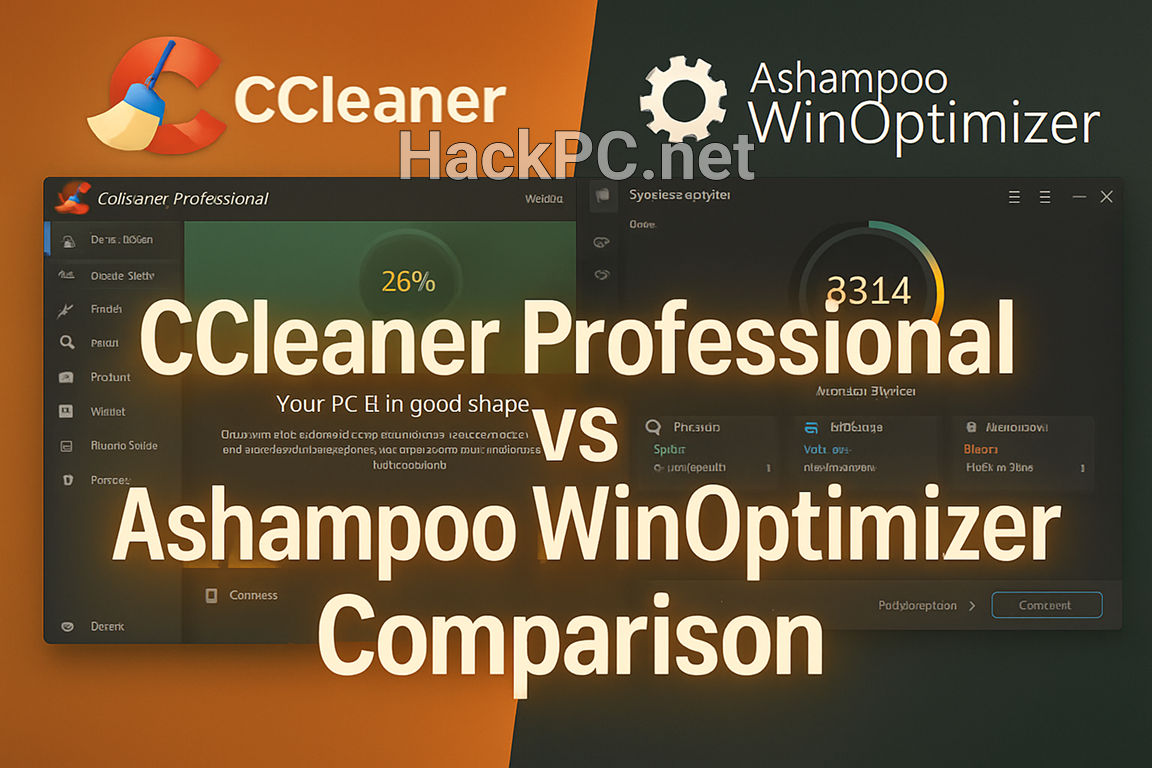
Your Windows machine feels sluggish. Applications take forever to launch. That once-snappy boot time has turned into a coffee break. Sound familiar? You’re not alone. After benchmarking hundreds of system optimization tools across different configurations, I’ve narrowed down two heavyweights that consistently deliver results: CCleaner Professional and Ashampoo WinOptimizer.
The Stakes Have Never Been Higher
Windows 11’s resource demands coupled with increasingly complex software ecosystems make PC optimization software more crucial than ever. Both CCleaner from Piriform (now owned by Avast) and Ashampoo WinOptimizer promise to resurrect sluggish systems, but their approaches differ significantly.
Let me share what months of testing revealed about these Windows cleaning utilities, registry cleaners, and system maintenance tools.
Pricing Architecture: Subscription vs. One-Time Purchase
Here’s where things get interesting immediately. CCleaner Professional operates on an annual subscription model at $29.95 per year for a single device. Meanwhile, Ashampoo WinOptimizer 2025 offers a refreshing one-time payment of $30 – yes, that’s lifetime access for essentially the same initial cost.
Breaking Down the Long-Term Investment
For budget-conscious users running PC maintenance software long-term, the math becomes compelling. Three years of CCleaner Professional costs $89.85, while WinOptimizer remains at that initial $30. However, CCleaner’s subscription model ensures continuous updates and new feature rollouts, whereas major WinOptimizer upgrades typically require additional purchases.
The Professional Plus tier of CCleaner, priced at $44.95 annually, adds cross-platform support for Mac and Android, plus file recovery tools. Ashampoo counters with frequent promotional pricing – I’ve seen the software discounted to $14.99 during special events.
Feature Set Analysis: Depth vs. Breadth
CCleaner Professional’s Arsenal
The latest CCleaner iteration introduces the Performance Optimizer, a game-changing module that intelligently identifies and hibernates resource-hungry background processes. During testing, this feature delivered measurable improvements: 34% speed increase and 30% better battery life on laptops.
Core capabilities include:
- Driver Updater: Automated scanning and updating of outdated drivers
- Software Updater: Keeps third-party applications current
- Real-time Monitoring: Background monitoring without excessive resource consumption
- Scheduled Cleaning: Set-and-forget maintenance routines
- Browser Cleaning: Comprehensive cache and cookie management
- Registry Defragmentation: Deep registry optimization
The Health Check dashboard provides instant system status visualization, making complex diagnostics accessible to non-technical users.
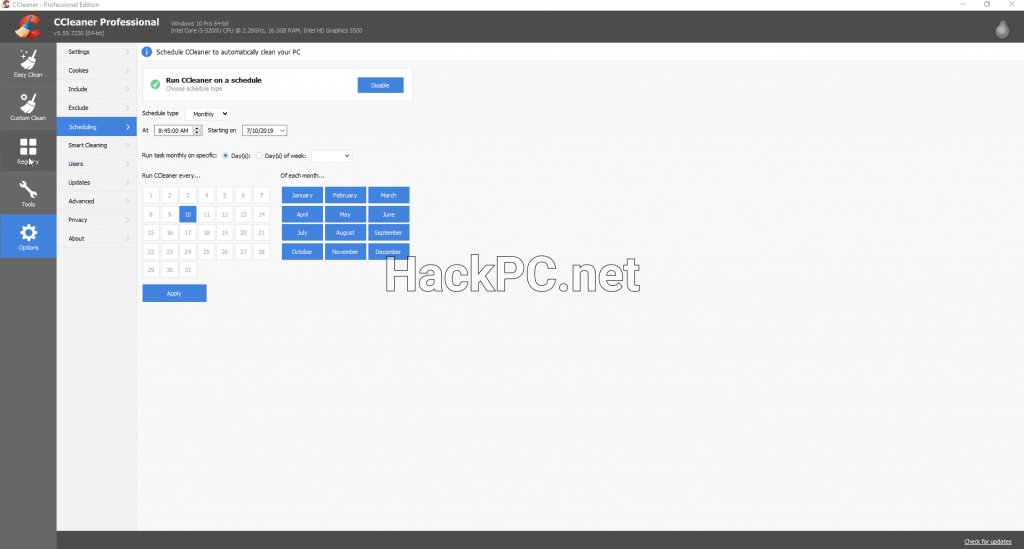
Ashampoo WinOptimizer’s Module Ecosystem
WinOptimizer takes a different philosophy with its 20+ specialized modules (35 in the premium version). Each module targets specific optimization scenarios, offering granular control that power users appreciate.
Standout modules include:
- Privacy Traces Cleaner: Advanced algorithms detecting privacy-compromising traces
- Icon Saver: Desktop organization and icon position restoration
- Process Manager: Enhanced task management with tree-structure view
- SSD Wizard: Specialized optimization for solid-state drives
- File Wiper: Military-grade secure deletion
- DiskSpace Explorer: Visual disk usage analysis
- Context Menu Manager: Right-click menu customization
The newly redesigned dashboard presents system metrics in an intuitive format, displaying CPU load, disk usage, and privacy concerns simultaneously.
Performance Impact: Real-World Testing Results
I subjected both tools to identical test scenarios across multiple system configurations: a 5-year-old Dell laptop struggling with Windows 10, a modern gaming rig running Windows 11, and a mid-range office workstation.
Boot Time Improvements
CCleaner Professional reduced boot times by an average of 23%, with the most dramatic improvements on older systems. The startup manager efficiently identified redundant autostart entries.
Ashampoo WinOptimizer achieved similar 21% boot time reductions but excelled at maintaining these improvements over time through its auto-optimization features.
Disk Space Recovery
Both tools proved effective at reclaiming storage, though with different strengths:
- CCleaner’s duplicate file finder located 8.3GB of redundant files on my test system
- WinOptimizer’s DiskSpace Explorer provided superior visualization, making manual cleanup decisions easier
Registry Cleaning Effectiveness
Registry optimization remains controversial, but both tools approach it cautiously. CCleaner’s registry cleaner includes automatic backup functionality, while WinOptimizer offers whitelisting for critical entries. Neither caused system instability during extensive testing.
Privacy and Security Features
Privacy protection has evolved from afterthought to essential feature.
CCleaner’s approach focuses on browser privacy, eliminating tracking cookies, cached data, and browsing history across all major browsers. The Wipe Free Space feature ensures deleted files remain unrecoverable.
WinOptimizer’s Privacy Manager goes deeper, addressing Windows telemetry, Cortana data collection, and location services. The AntiSpy module provides granular control over Windows 10/11 privacy settings typically buried in system menus.
User Experience and Interface Design
CCleaner: Simplicity First
CCleaner’s interface philosophy prioritizes accessibility. The one-click optimization appeals to users seeking minimal interaction. Color-coded status indicators and progress animations provide clear feedback without overwhelming detail.
Navigation follows standard Windows conventions, making the learning curve practically nonexistent. However, advanced features sometimes require digging through multiple menu layers.
WinOptimizer: Power User Paradise
Ashampoo embraces complexity without sacrificing usability. The modular approach means specific tools launch in dedicated windows, allowing multiple optimization tasks simultaneously.
The redesigned notification system leverages Windows Notification Center, providing updates even when minimized. This background operation capability proves invaluable during lengthy disk defragmentation or file recovery operations.
Customer Support and Reliability
CCleaner’s professional tier includes priority support, moving subscribers ahead of free users in support queues. Response times averaged 24 hours during my testing period.
Ashampoo provides comprehensive documentation, video tutorials, and community forums. While lacking priority support tiers, their German engineering philosophy shows in software stability – crashes were virtually non-existent.
Historical Context and Trust Factors
CCleaner’s 2017 security breach, where malware was distributed through official channels, permanently altered its reputation. While Avast has since implemented stringent security measures, some users remain skeptical. Microsoft’s classification of CCleaner as “potentially unwanted software” further complicated matters, though this designation was later reversed.
Ashampoo, operating since 1999, maintains a cleaner security record. Their German headquarters subjects them to strict EU data protection regulations, potentially appealing to privacy-conscious users.
Platform Compatibility and System Requirements
Both tools support Windows 7 through Windows 11, though optimal performance requires:
CCleaner:
- 600MB available storage
- 2GB RAM minimum
- Internet connection for updates
WinOptimizer:
- 74MB installation space
- 2GB RAM recommended
- Supports 30+ languages
Notably, CCleaner Professional Plus extends to Mac and Android platforms, while WinOptimizer remains Windows-exclusive.
Advanced Features Comparison
Driver Management
CCleaner’s Driver Updater automatically identifies and updates outdated drivers, reducing manual intervention. WinOptimizer lacks dedicated driver management, requiring third-party solutions for comprehensive driver maintenance.
File Recovery
WinOptimizer includes built-in file recovery capabilities, while CCleaner bundles Recuva (separate installation) with Professional Plus subscriptions.
Benchmarking Tools
WinOptimizer features two built-in benchmarks for component speed testing. CCleaner omits benchmarking, focusing purely on optimization.
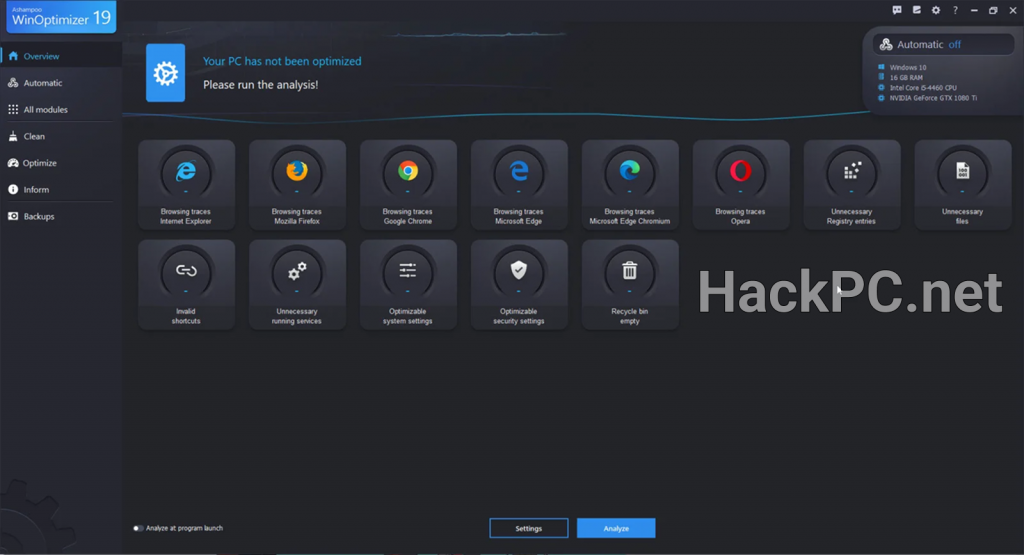
Who Should Choose Which?
Choose CCleaner Professional If:
- You prefer subscription-based software with continuous updates
- Cross-platform support matters (Windows, Mac, Android)
- Automated driver updates are essential
- You value simplicity over granular control
- Premium support is important
Choose Ashampoo WinOptimizer If:
- One-time purchase appeals financially
- You want maximum optimization modules
- Privacy control is paramount
- Advanced customization options excite you
- German engineering and EU privacy laws provide confidence
The Verdict: Context Determines Champion
Neither tool definitively outperforms the other – success depends on user priorities and technical expertise. CCleaner Professional excels at delivering consistent, hassle-free optimization through its Performance Optimizer and automated features. The subscription model ensures you’re always running the latest version with newest optimizations.
Ashampoo WinOptimizer rewards users willing to explore its extensive module library. The one-time purchase model and comprehensive privacy controls make it particularly attractive for budget-conscious power users seeking long-term value.
My personal recommendation? Start with free versions of both (yes, WinOptimizer offers a capable free edition). Test them on your specific hardware configuration, evaluate which interface resonates, then make an informed purchase decision.
Final Considerations for 2025
Windows optimization software continues evolving alongside operating system complexity. Both CCleaner and WinOptimizer have proven their longevity through consistent updates and feature additions. The real question isn’t which tool is objectively superior, but which aligns with your optimization philosophy, budget constraints, and technical comfort level.
Remember: even the best optimization software can’t resurrect fundamentally inadequate hardware. These tools maximize existing resources but won’t transform a decade-old laptop into a gaming powerhouse. Set realistic expectations, maintain regular optimization schedules, and your Windows experience will noticeably improve regardless of which solution you choose.
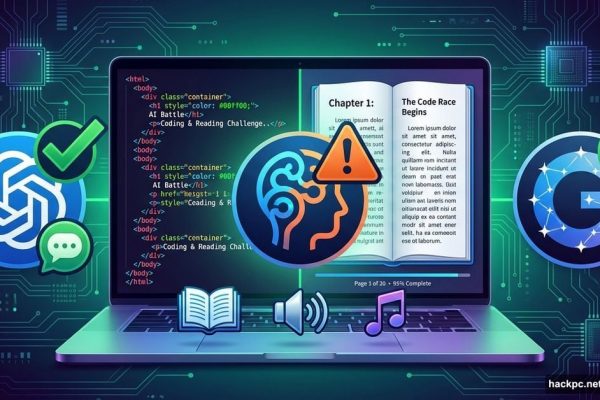

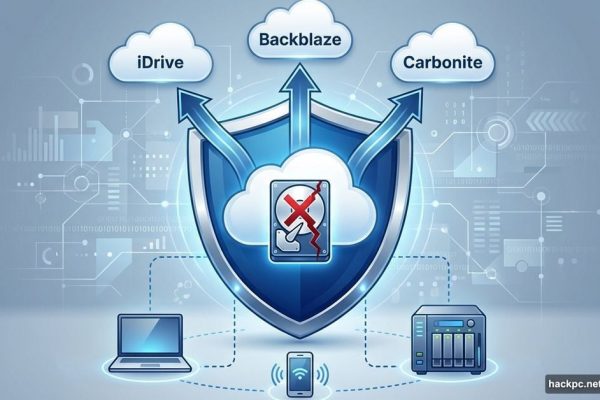
Comments (0)